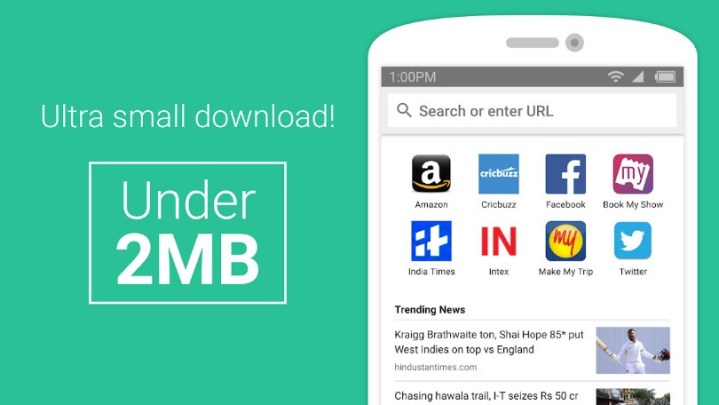
Mobile users in developing nations with slower internet connections don’t need to download Chrome or go onto Safari — instead, they can simply get on Internet. The aptly named app is the latest product to emerge from Amazon, and it’s an Android web browser meant specifically for emerging markets. On Google Play, the full name of the app is “Internet: Fast, lite and private,” and it promises to be “lighter than the competition.”
Currently, it’s available exclusively in India, and requires devices to be running Android 5.0 or later. Like many other “lite” apps (think Facebook Lite, YouTube Go, and others), Internet takes up very little space — less than 2MB. Compare that to Chrome, which takes up 21MB of space, or Firefox, which requires 19.9MB, according to a report from appFigures. The extremely pared down nature of the app gives users plenty of extra space to complete downloads, which might otherwise be costly and extremely time consuming.
Moreover, Internet claims to be private, which means that it doesn’t request additional permissions while you’re browsing, nor does it collect data like many other browsers do. Additionally, Internet allows users to open Private tabs, even further indicating its focus on user privacy (a good move, considering recent developments regarding Facebook and Cambridge Analytica).
While it’s no surprise that Amazon is offering a lighter version of a browser, it is rather curious that it opted to create a brand new browser instead of adapting its existing Silk browser to data-strapped markets. That said, Amazon has been extremely quiet about the launch of the app, so it could be the case that there is more to come in the near future.
It also remains to be seen whether Amazon will expand Internet to markets outside of India — as it stands, the browser is highly targeted to its audience. For example, the homepage not only shows general headlines, but also news about cricket, which is especially popular in the southeast Asian nation.
Amazon has not commented on reports of the new app, and will likely be staying mum on the subject awhile longer. All the same, we’ll update you as we learn more about what to expect from Internet moving forward.
Editors' Recommendations
- Pay-with-palm coming to all of Amazon’s Whole Foods Market stores
- Apple customers spent record amount on apps on New Year’s Day
- The best marketing apps for small businesses
- Amazon bets big on its internet-from-space plan with major new facility
- Update your Google Chrome browser now: New exploit could leave you open to hacks


